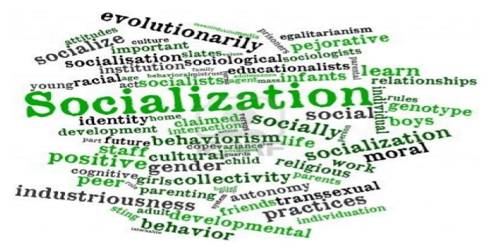Socialization is known as the process of inducting the individual into the social world. It is the means by which human infants begin to acquire the skills necessary to perform as functioning members of their society. The term socialization refers to the process of interaction through which the growing individual learns the habits, attitudes, values, and beliefs of the social group into which he has been born.
Anticipatory socialization and Re-socialization:
Anticipatory socialization refers to the processes of socialization in which a person “rehearses” for future positions, occupations, and social relationships. It comes from an individual’s desire to join a group while resocialization is imposed upon an individual by a group. was first defined by sociologist Robert K. Merton. It has its origins in a 1949 study of the United States military which found that privates who modeled their attitudes and behaviors on those of officers were more likely to be promoted than those who did not. Examples of anticipatory socialization include law school students learning how to behave like lawyers, older people preparing for retirement, and Mormon boys getting ready to become missionaries.
Re-socialization refers to the process of discarding former behavior patterns and reflexes, accepting new ones as part of a transition in one’s life. It refers to a relationship between two (i.e. a dyad), three (i.e. a triad) or more individuals (e.g. a social group). This occurs throughout the human life cycle. Re-socialization can be an intense experience, with the individual experiencing a sharp break with his or her past, as well as a need to learn and be exposed to radically different norms and values. Key examples include the process of resocializing new recruits into the military so that they can operate as soldiers (or, in other words, as members of a cohesive unit) and the reverse process, in which those who have become accustomed to such roles return to society after military discharge. Resocialization may also be required for inmates who come out of prison and need to acclimate themselves back into civilian life.
Key Points
- Anticipatory socialization is the process of changing one’s attitudes and behaviors in preparation for a shift in one’s role.
- The process of anticipatory socialization is facilitated by social interactions with the group they aspire to join.
- Resocialization is radically changing an inmate’s personality by carefully controlling their environment.
- Resocialization is a two-part process. First, the staff of the institution tries to erode the residents’ identities and independence. Second, there is a systematic attempt to build a different personality or self.
Information Source:
















